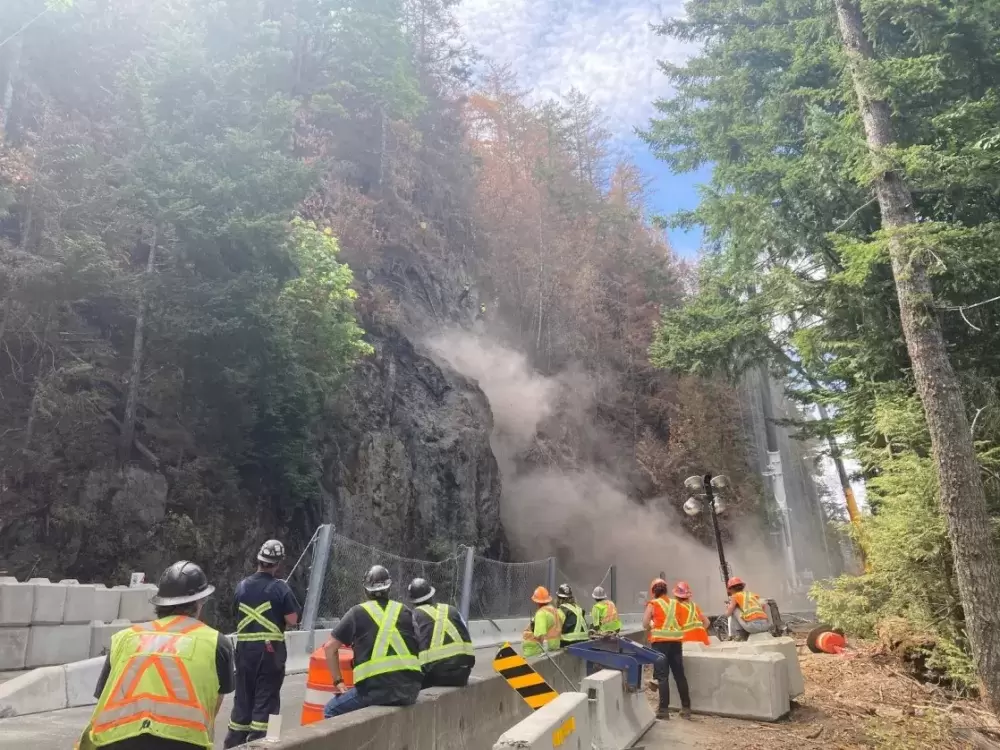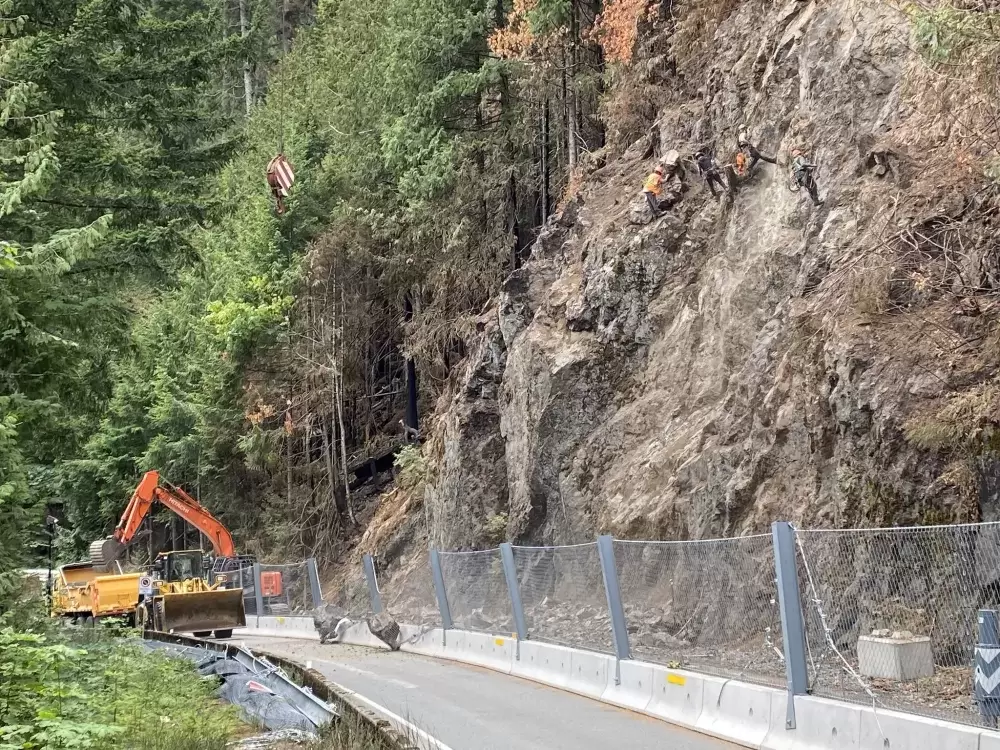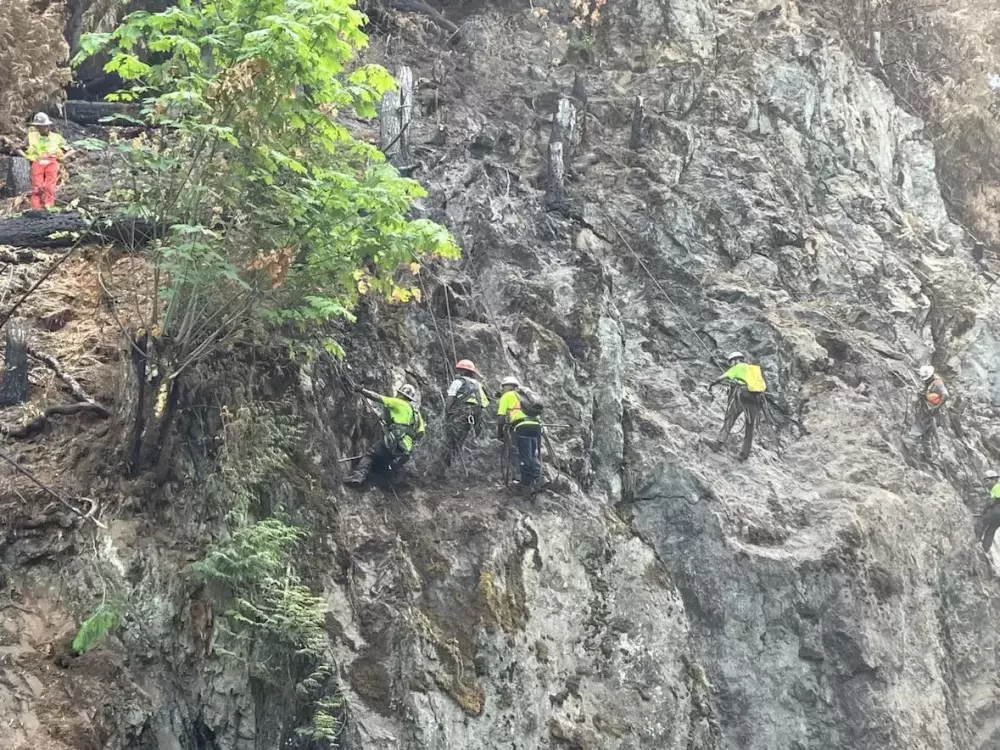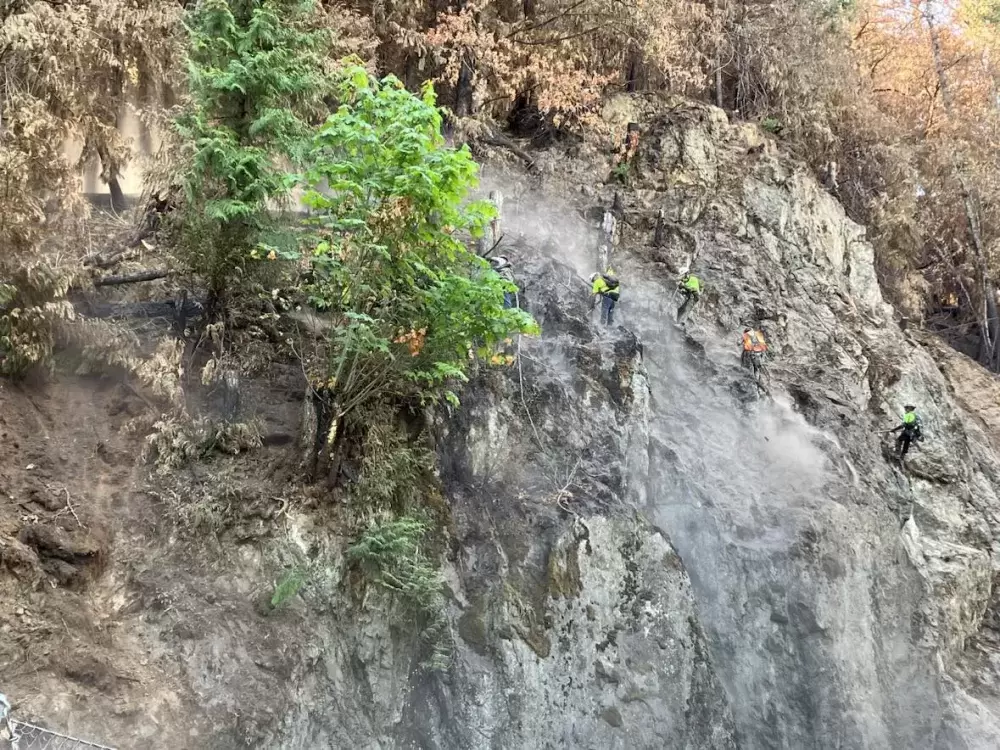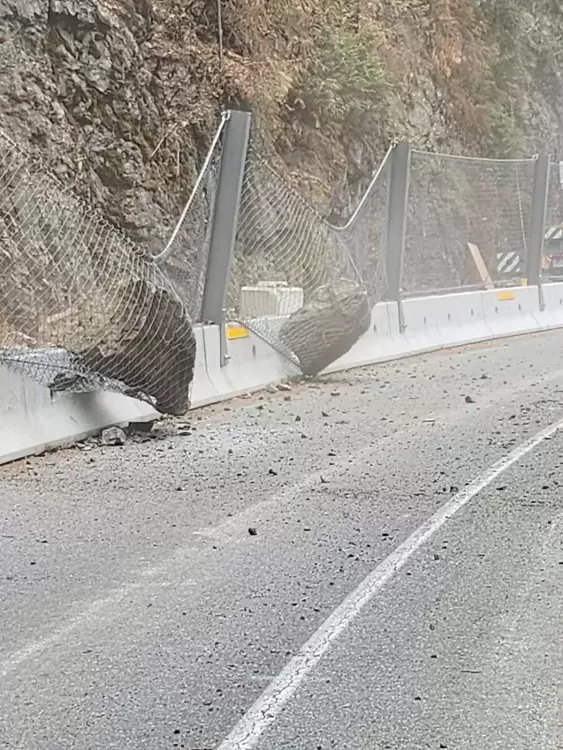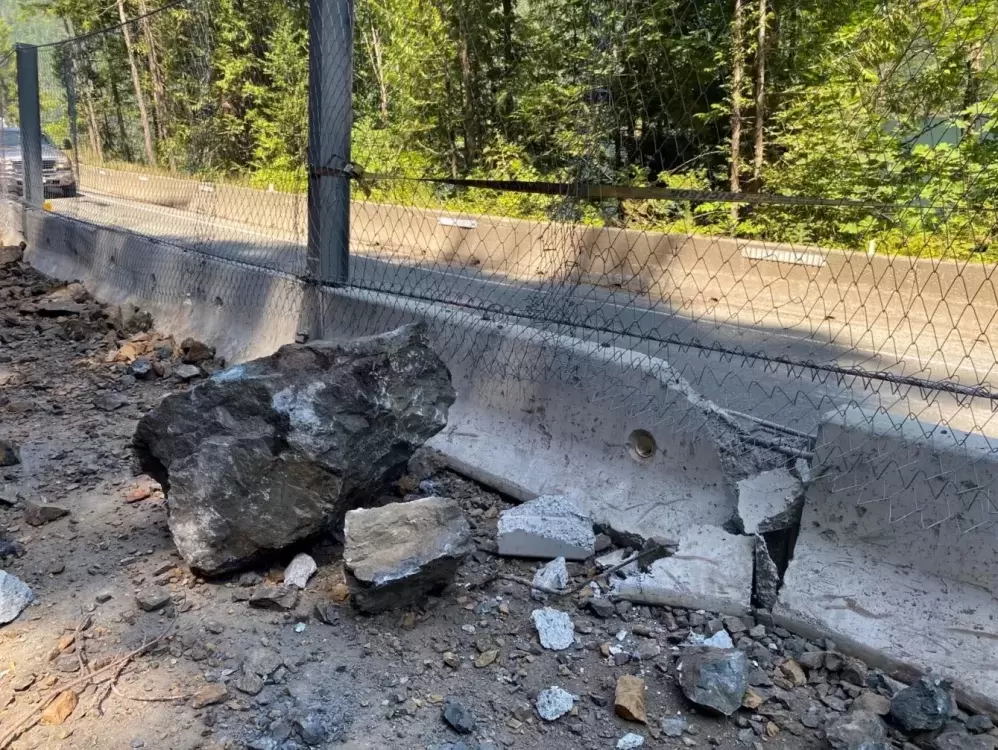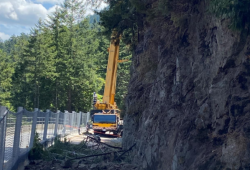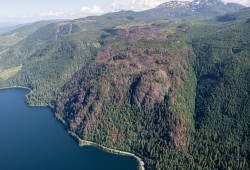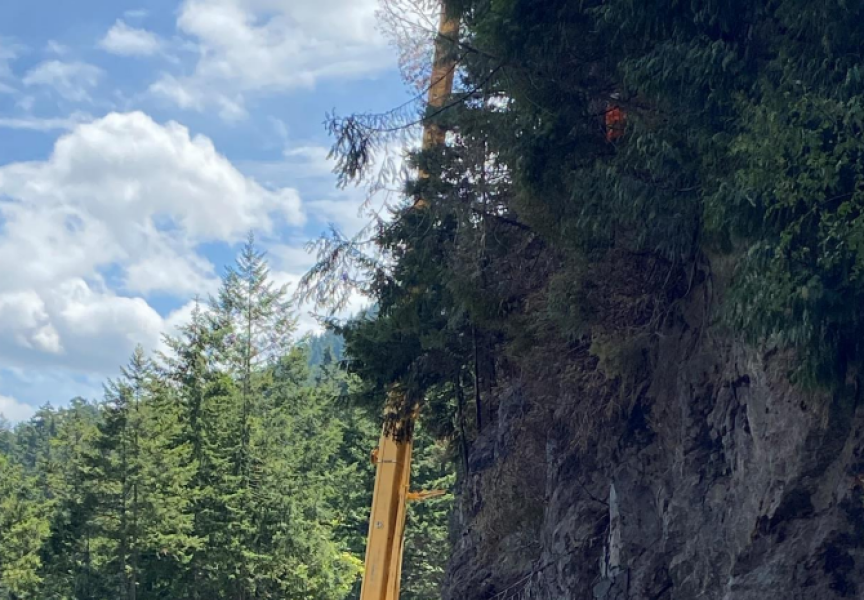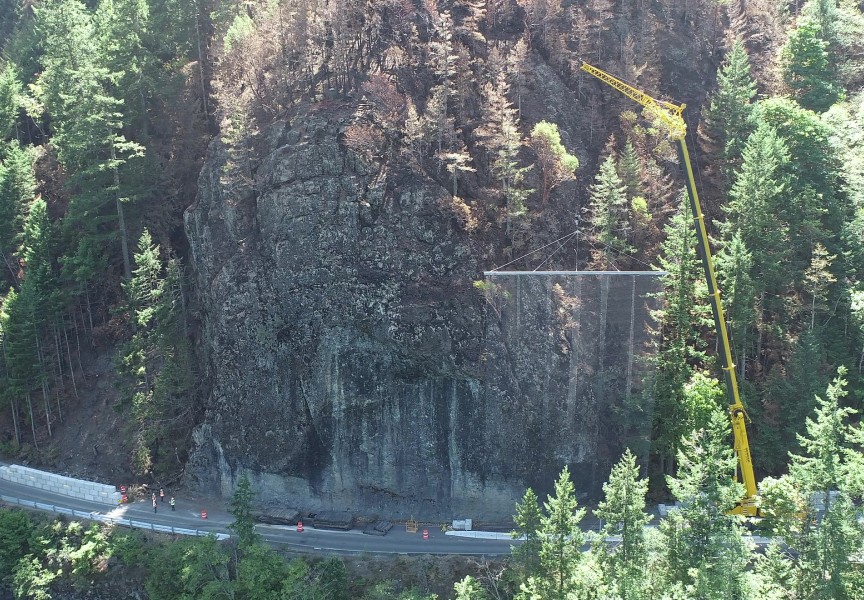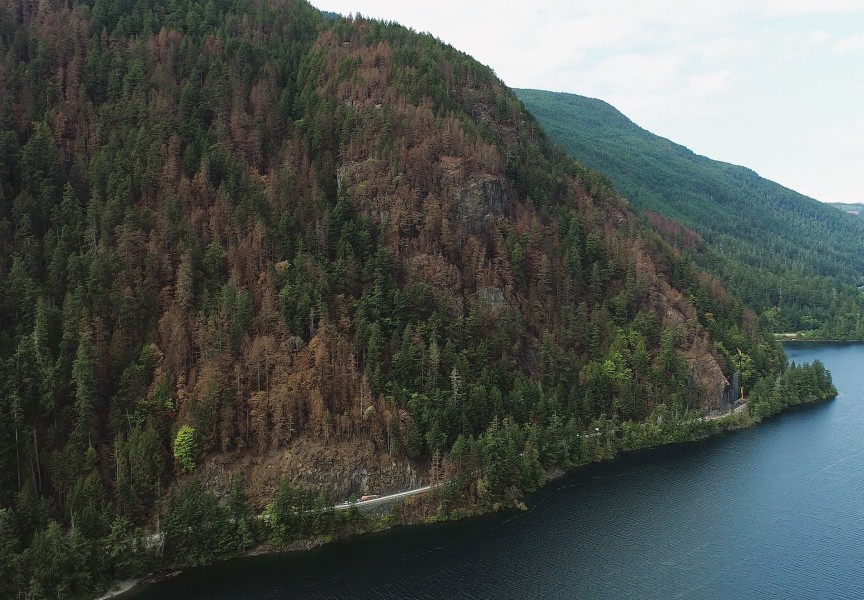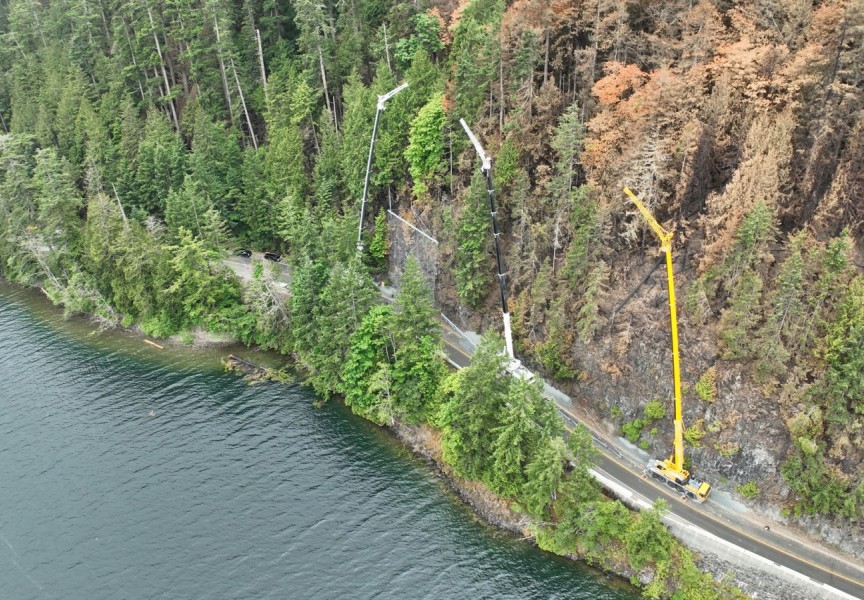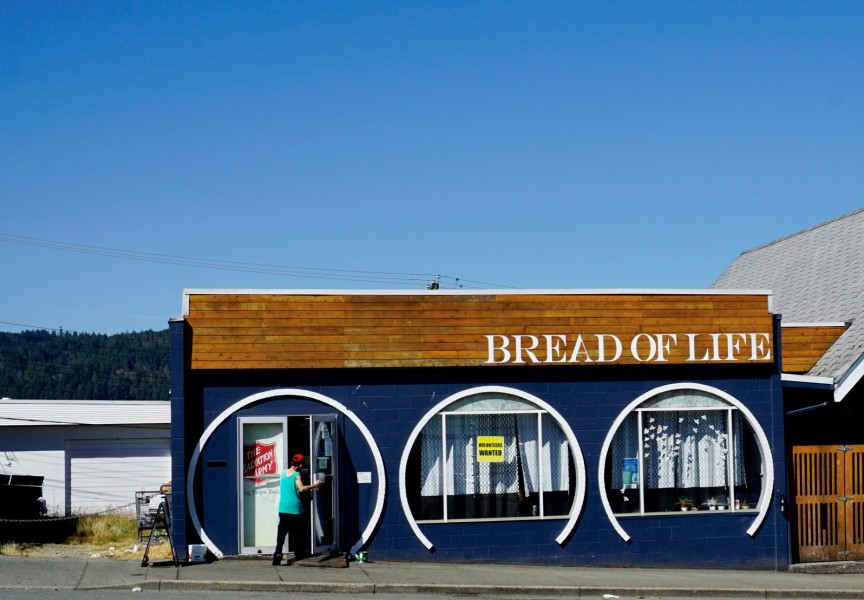As economic costs continue due to delays in the aftermath of a wildfire that shut off highway access early this summer, the province has yet to answer calls to consider a permanent alternate route into Port Alberni.
Instead, it will focus on “ensuring the stretch of Highway 4 near Cameron Lake bluffs is restored and fully operational for travel,” says B.C.’s ministry of Transportation and Infrastructure.
For nearly three weeks in June Highway 4 was shut down, as crews battled a forest fire next to Cameron Lake that burned down a mountainside to the edge of the road, eventually encompassing 229 hectares.
The highway reopened on July 23, with a single lane of alternating traffic bringing travel delays that have ranged from a few minutes to hours. With cranes holding large nets and temporary walls protecting traffic from falling debris, bringing Highway 4 back to its normal, two-way flow has proved more challenging than the province anticipated, pushing the expected full reopening back a month to mid-August.
Since July 17 crews have worked the steep slope over Cameron Lake, clearing loose rocks and dangerously burned trees to permanently restore the only highway access to Port Alberni and communities in the Clayoquot and Barkley Sound regions. This work has brought temporary closures, usually 9 a.m. to 11:30 a.m. and 1:30 p.m. to 5 p.m. on weekdays to the seven-kilometre section of highway along Cameron Lake and Cathedral Grove.
The ministry has and will direct its efforts to Highway 4, noting the five-year, $54-million project to improve safety over Kennedy Lake that finished this spring near Vancouver Island’s west coast.
“That’s why funding and focus has been placed on making Highway 4 a safe and reliable route for travellers, through projects like the now-completed Kennedy Hill Safety Improvement project and ensuring the stretch of Highway 4 near Cameron Lake bluffs is restored and fully reopened for travel,” wrote the Ministry of Transportation in an email to Ha-Shilth-Sa.
But this isn’t enough to satisfy the concerns of multiple municipalities and First Nations west of Cameron Lake, who faced a collective sense of vulnerability in June when the one road they rely on for essential transport was closed. At that time a letter went to the provincial and federal governments, calling for the immediate investment into a “permanent access road” to Port Alberni. This letter was signed by elected leaders from the Tseshaht, Tla-o-qui-aht, Huu-ay-aht, Hesquiaht and Ditidaht First Nations, as well as the Nuu-chah-nulth Tribal Council, the Alberni Clayoquot Regional District and the District of Ucluelet.
Then on July 10 Port Alberni’s city council directed staff to make a letter urging the province and feds “to take immediate action on securing a permanent second access road.”
Although one lane of Highway 4 has reopened at designated times, a few unscheduled closures have stranded travellers and transport on either side of Cameron Lake. The most recent incident shut the highway down for an afternoon and overnight period on July 25-26, when high winds compromised the safety of the nets. When the wind had died down a crane was unable work and needed repairs, according to the Ministry of Transportation.
NTC President Judith Sayers has seen the highway’s uncertainty affect people’s lives in a variety of ways.
“I think everybody is being impacted, whether it’s economically, socially, medically they’re frustrated because they can’t get to appointments,” she said. “Some of our First Nations people are really suffering, especially those that are into tourism.
To keep essential supplies moving, a detour route was established on June 7, the day after Highway 4 closed at Cameron Lake. Using a circuit of logging roads from Lake Cowichan, past Nitinaht Lake to Port Alberni, this detour tacked hours onto the standard travel time, but did allow store shelves in Port Alberni, Tofino and Ucluelet to remain stocked. This detour remains in place as crews work along Cameron Lake.
“The ministry successfully opened the current detour route to bring a lifeline of access to those needing to travel through Port Alberni and this part of the island,” stated the Ministry of Transportation. “This detour ensured commercial goods could be delivered and supply chains were not impacted.”
But there has been a significant economic cost, according to the Tofino and District Chamber of Commerce. West coast businesses were surveyed to measure losses during the June highway shutdown, totals calculated to be $29.7 in Tofino and $14 million in Ucluelet.
“Businesses that rely on tourism – which makes up the majority on the west coast – were prepared for the busy season with full levels of supplies and staff when the fire shut down Highway 4,” stated the chamber in a press release. “Most of the affected businesses were not eligible for business interruption insurance or government assistance. Some workers were able to access EI, but many that are temporary or seasonal staff did not qualify.”
These struggles have continued in July after the highway reopened, according to the Alberni Valley Chamber of Commerce.
“Even though the road opened to single-lane alternating, the scheduled closures still impact businesses – it’s impacting freight and shipping. Some businesses would get multiple deliveries a day and they’re only receiving one, and so that impacts their service delivery,” said Chief Executive Officer Jolleen Dick. “Now that we’ve had three unexpected closures that were not scheduled, that is putting a lot of pressure on businesses and strain on people, especially visitors that had no where to go when the road closed the other night.”
Like on the west coast, some Alberni Valley businesses have had to let go of staff.
“When the road closed, folks had to either reduce their hours or lay people off,” said Dick, adding that some of the temporarily laid off workers found other employment outside of tourism and hospitality during the highway closure. “It is hard and difficult for employers when we are experiencing a labour shortage. It’s been tough for everybody.”
In expressing the chamber’s commitment to the region’s businesses, Dick stressed the need for a secondary route to for the Alberni Valley and the west coast.
“This road closure and the unexpected closures have showed how dependent we are on this one trafficway and it’s disrupted everybody’s livelihoods and their businesses,” she said.

